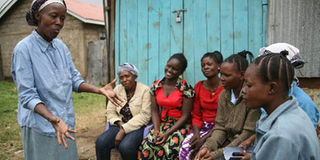Empowerment deterred: When chamas become vulnerable

A women group’s meeting. Chamas officially become self-help groups when they register with the Department of Social Development and Senior Citizen Affairs under the Ministry of Labour and Social Protection.
What you need to know:
- Only through formalising their associations do chamas access State affirmative funds such as the National Government Affirmative Action Fund, the Women Enterprise Fund or the Youth Enterprise Development Fund and Uwezo Fund.
- To be registered, a group must have more than 10 members, 70 per cent of whom are women and 30 per cent men.
Chama is an informal Swahili name referring to a micro-savings group predominantly comprising women. But these days, men have also been incorporated into women’s groups.
In other instances, men have formed their own chamas. These chamas, however, officially become self-help groups when they register with the Department of Social Development and Senior Citizen Affairs under the Ministry of Labour and Social Protection.
Only through formalising their associations can they access State affirmative funds such as the National Government Affirmative Action Fund, the Women Enterprise Fund (Wef) or the Youth Enterprise Development Fund and Uwezo Fund.
To be registered, a group must have more than 10 members, 70 per cent of whom are women and 30 per cent men.
In the chamas, often members practise table banking, a concept that earned its popularity in Kenya in 1999 after the Poverty Eradication Commission, then under the Ministry of Planning and Vision 2030, singled it out as a means of eradicating poverty.
In the preceding period, the chamas adopted a merry-go-round strategy, in which members shared out their contributions on a rotational basis.
Table banking is a funding strategy with an ‘immediate effect’ since the members make their savings at a regular period and borrow instantly, usually at less than 10 per cent interest. It is a prerequisite for any self-help group seeking government’s affirmative funds.
In a 2014 article published in BusinessDaily, a Nation Media Group publication, Rafiki Microfinance Bank estimated that one in every three Kenyan adults is a member of an investment club, translating into more than 300,000 groups. Some would still be informal.
Prof Grace Ngare, policy and advocacy lead at Kenyatta University Women's Economic Empowerment Hub, could attest to this in an earlier interview. She said she is a member of multiple informal chamas, some of which are family-oriented.
“For instance, there is one I contribute Sh1,000 and another Sh20,000. So these chamas cut across all social groups,” she said.
Accurate figures on the contribution of the chama economy to Kenya’s growth are scanty, but the Business Daily article estimated that the investment groups control assets worth about Sh300 billion.
Members invest in a range of enterprises, including fisheries, agriculture, real estate, dairy and large-scale farming. They improve their lives by educating their children, buying land, and building their own houses.
Principal investigator evaluating affirmative funds at the University of Nairobi Women's Economic Empowerment Hub, Njeri Karuru, said in an earlier interview that while chamas are major empowerment vehicles, internal and external factors greatly affect how the women are powered economically and socially.
In her research work, she has met and spoken with different women in self-help groups across Kenya who have professed improved socioeconomic standards.
“In Laikipia, the women said the groups have preserved their dignity because they can borrow from their groups instead of asking for money from individuals who look down upon them,” she said.
In Nakuru, she met women who trade tomatoes and from their savings and a boost from Wef, they have collectively bought land and built their own houses.
But she proposes a change in the mode of awarding the loans because oftentimes group members are at different levels of development. And with a group loan, members are forced to grow homogeneously even when some make faster progress than others.
“They should give members the loans as individuals. Some members are running a marathon while others are running 100 kilometres. When they are given the loans as a group, it then means they all have to run at the same pace,” she said.
She pointed out that Covid-19 laid bare groups’ economic vulnerability owing to the women’s investment in small-scale businesses which draw irregular income.
“For instance in Toi market, the women realised people are not buying clothes. They were forced to diversify to the food business to raise money to repay the loans because nobody cares how you will pay back the loan,” she shared.





